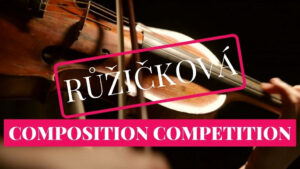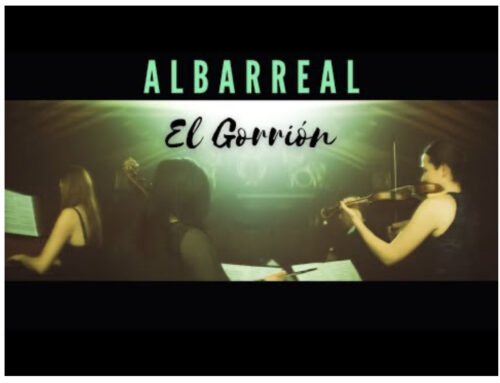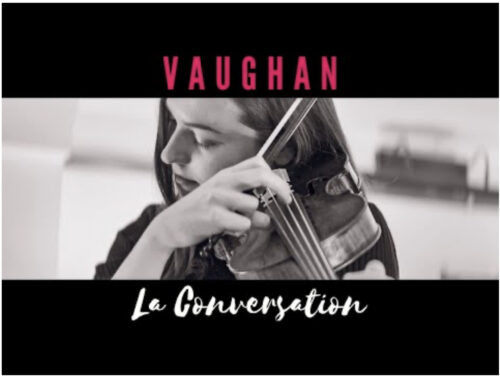
The Viktor Kalabis Prize Winners
ADAWITCZYK.COM –is delighted that our partnership continues with the Victor Kalabis & Zuzana Ruzickova Foundation and we’re honored to name our competition in her memory. 2024 saw the competition entering its fifth year and its popularity grows with over 50 submissions for the 2024 awards.
Celebrating the life and career of one of the world’s leading harpsichordists Zuzana Ruzickova and her invaluable role in promoting pieces by modern composers on period instruments.
Please visit the competition website to learn about the many winners and their music from previous years.
2020 Competition
2021 Competition 2022 Competition 2023 Competition
2024 Competition
Pieces came from all over the world and over 50 composers participated in 2024 edition of the competition.
Due to the incredibly high standard of this year’s competition we awarded not 5, but 6 prizes to our wonderful composers.
The Ruzickova Composition Competition 2024 judging panel is honored to announce that the following pieces won the Viktor Kalabis Prize (and therefore will be recorded later this year and released by First Hand Records) and Prima la musica publishing prize.
‘One of Seven’ by Alexander Unseth
‘L’apothéose de Tati: Grande sonade, en trio pour deux violons et clavecin’ by David Jason Snow
‘No 1,2&3’ by Fabricio Maximiliano Gatta
‘Sonata for baroque violin and harpsichord’ by Raphael Amadio Fusco
‘Ostination’ by Salvatore Passantino
‘The Summer Folly’ from Vanbrugh Sonata by Andrew Wilson
Recording chosen Viktor Kalabis Prize pieces.
The winning pieces will be recorded this summer and then publicly released.
For the earlier competitions below, please click on the highlighted links to listen and to watch the individual performances.
2023 Winners
An Vedi
The composer’s winning piece “Voices of Angels” – “Concerto for Violin and Orchestra «Voices of Angels» is dedicated to the memory of Zuzana Růžičková and the children who died in concentration camps during the Second World War. I saw one of these camps (Buchenwald) in 2016, and I experienced a deep shock from the very place where there were barracks with Jews, Poles, Russians and other peoples next to each other.”
Isidro Albarreal Delgado
”Memories of Malacuesta” is a Violin Concerto with string orchestra in E minor, that depicts some stories
of my childhood and adolescence next to my dad at our estate called Malacuesta (Bad Slope). Given that
name due to the terrible uphill road that needs to be driven to get to the house, it is a wonderful and wild
place in the middle of nowhere that has given us a lot of great moments and adventures.
Dr. Klaus Miehling
Concerto in d, op. 353 (2023). After the concerti in F major (op. 30, 1990), also for baroque instruments, and e minor (op. 100, 2004), for modern instruments, this is my third violin concerto and the first to be performed.
2022 Winners
Susie Vaughan La Conversation Enchantée et Galante and Isidro Albarreal El Gorrión (The Sparrow)
Susie Vaughan trained as a composer at the Guildhall School of Music and Drama (MMus, Lutoslawski Prize: 2nd Prize) after receiving a BMus (1st Class Hons) at Royal Holloway and a British Academy Award to undertake postgraduate research at Magdalen College, Oxford. Her research into Postmodern music has influenced her own compositional style.
Susie is particularly interested in setting love poetry through the ages (from Sappho to Shakespeare to Sylvia Plath) and devotional text. She was the first woman in 550 years to compose for the Choir of Magdalen College, Oxford – a Magnificat and Nunc Dimittis to celebrate 20 Years of Women at the College in the Year 2000.
A fun-fact about Susie – discovered whilst researching her ancestry during the COVID Lockdown – is that she is Henry Purcell’s first cousin, nine times removed.
“My piece La Conversation Enchantée et Galante was inspired by Ada’s brief to ‘explore Telemann’s Paris Quartets and celebrate the art of conversation between instruments.’ To explore this galant style, I started with the ensemble quaver motif from B.16 of the Modéré in the final E minor Quartet: 6th Quatuor TWV 43:e4 – my favourite movement and the very last movement in the Paris Quartets – and transformed this into a semi-quaver motif heard at the beginning of the piece and later as an accompanying background ‘buzz’ in the instrumental conversation.
“The subtitle of the piece – Le Chardonneret est le Fantôme dans la Machine – was inspired by the painting of a Goldfinch sitting on a branch on the soundboard of the beautiful 1769 Pascal Taskin Harpsichord in the Russell Collection in St Cecilia’s Hall, Edinburgh, the disposition of which, I have used for this piece. The painted Goldfinch comes to life and flies into the music, making his appearance in the song-like trills in all the instrumental parts and in the fluttering chords in the Harpsichord. At the end of the piece, in the Distrait section – another nod to Telemann’s movement descriptions – the Goldfinch flies around and distracts the group of musical conversationalists, leaving just the Flûte Traversière and Harpsichord (using the Buff Stop) to represent his flutterings and twitterings, before flying back to his painted branch on the soundboard of the Harpsichord, where he becomes once more inanimate, leaving a concluding cadence trailing away the instrumental conversation.
===
Isidro Albarreal El Gorrión (The Sparrow) is a passionate musician, specialising in early music and historical performance of the violin and viola, currently based in The Netherlands. Born in Sevilla (Spain), he was accepted in 2012 into the Conservatorium van Amsterdam to complete his Bachelor degree in Baroque violin, studying with Sophie Gent, Shunske Sato and Cornelis Koelmans. He also studied chamber music with Ton Koopman, Alfredo Bernardini, Pieter van Heyghen, Jed Wentz, Menno van Delft and Eduardo López Banzo; baroque viola with Jane Rogers; and orchestral playing with Sigiswald Kuijken, Giulio Prandi, Paul Dombrecht, Robert Levin and Richard Egarr.
Isidro currently plays with such baroque ensembles as Concerto Köln, Orquesta Barroca de Sevilla, Bremer Barockorchester, La Chimera – Eduardo Egüez, Florilegium Musicum, Bach Orchestra of the Netherlands and Amsterdam Corelli Collective, awarding him the opportunity to work with conductors like Enrico Onofri and Riccardo Minasi. With them he has performed in prestigious concert halls such as the Muziekgebouw aan’t Ij, Concertgebouw van Amsterdam, the Dutch National Opera & Ballet, Teatro de la Maestranza and the chapel of the Royal Palace in Madrid, as well as in festivals such as the Grachtenfestival Amsterdam, MABrugge Festival, Utrecht Oude Muziek Festival, Festival Internacional de Arte Sacro of Madrid, Festivalde Música Antigua de Sevilla, Festival d’Ambronay, Internationale Händel-Festspiele Göttingen and Innsbrucker Festwochen der Alten Musik.
El Gorrión (The Sparrow) is a piece inspired by the singing of birds written in the style and form of the French Ouverture. “The slow parts are full of trills and the main motif is drawn with trill, an ”inusual” fast jump and an appoggiatura that tries to describe the sounds of the birds that come every morning to my balcony where they get their breakfast. The fact that I chose El Gorrión as the name of the piece is mainly emotional. It ́s a bird that I love and that is very common in the south of Spain, where I come from. It ́s a humble creature, but strong and cute, and it ́s directly connected to my childhood and the people I love.
“The explanation for the inspiration of the theme for the fugue is less romantic, since I wrote it on a train going to a gig and it just came to my mind. What I had clear from the beginning was that I wanted a rythmical bass, with complementary rhythms that give variety and continuity. Inspired by Bach and many other baroque composers, I hardly ever treat the bass as a mere accompaniment, but instead as a main voice that gives the piece the flow and rhythm I feel it needs.
“Attending to musical aspects, I tried to give a lot of importance to the interaction between all the instruments, and to be sure that all of them have their moment to shine and their moment to accompany. One of the things that I love the most about baroque music is counterpoint. The fact that entire different melodies can work together over the same harmony is something that still amazes me and inspires me after all these years, and I try to convey it in my music. In terms of sonority, I wanted to give the instruments the room for them to have a proper resonance. Therefore, I tried not going to extreme ranges or forcing them to do difficult or virtuostic things, but rather keep them in a comfortable place for the players that also allows the instruments to resonate. It ́s also one of the reasons why I chose D minor for my composition, since it suits well the required instruments for this year ́s competition, and it allows me to write for them in a more idiomatic way.”
===

El Gorrión (The Sparrow) La Conversation Enchantée et Galante
Viktor Kalabis Prize – 2 successful works were recorded in video performances by director Simon Helbling and his crew last year. This aligns with our continuing focus to present music in engaging ways outside of the traditional concert hall. To find out more about our previous collaborations watch Biber’s Rosary Sonata No.1 here. Prima la musica Prize – this year our audience will pick 1 piece to be published by one of the UK’s foremost early music publishers Prima la musica! during a live performance in London later this year!
===
Learn more about Ada Witczyk.
Facebook: @adawitczykviolin
Instagram: adawitczyk
